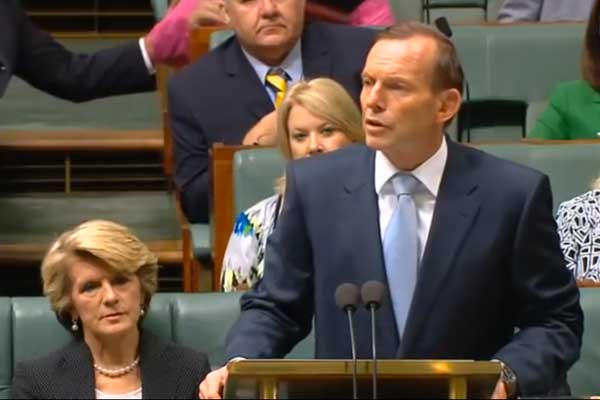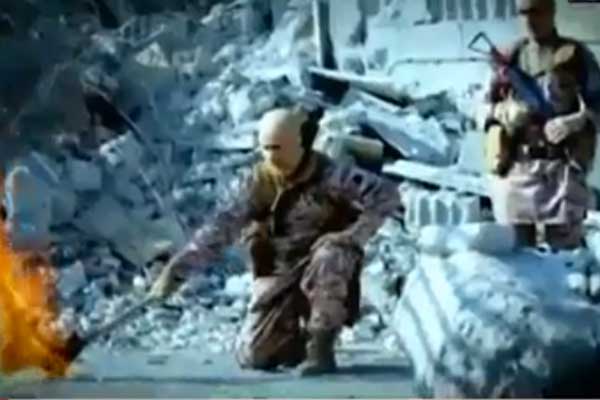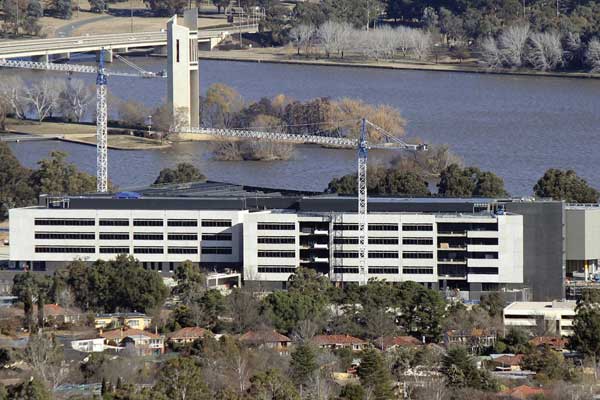Is terrorism, as our Prime Minister argues, “rising at home and abroad”? Is it “becoming harder to combat”?
Is the fiendish social media campaign of the Islamic State really “infecting people” and “grooming them for terrorism”?
And, if so, does the scale of this rising threat warrant the rapid dissolution of centuries’ worth of civil liberties for Australian citizens, including the right to be a citizen in the first place?
These are weighty questions, and those of us confronted by an embattled Prime Minister desperately banging the terrorist drum must not let that desperation distract us from the gravity of the charges.
It is all too easy to simply dismiss Abbott. An embattled Prime Minister is fighting for his political life. As Nicholas Stuart wrote in the Canberra Times today, Abbott is “banging cymbals and creating noise to prevent us focusing on what's going wrong.”
But to simply dismiss the Prime Minister’s claims about terrorism would be to play into the Coalition’s hands. National security is too important to leave to the spies, generals and politicians.
No, we need to examine Tony Abbott’s claims seriously, and see if they stack up.
If true, they suggest that Australian society faces its gravest threat in decades. That the peaceful multiculturalism that remains the envy of most of the world is now endangered. That lone wolf attackers are poised to rise from our midst and shatter Australia’s relaxed and comfortable way of life.
In other words, if Tony Abbott is correct in what he says, we really should be afraid, very afraid. Afraid enough, perhaps, to sacrifice much of what modern Australia used to stand for: tolerance, harmony, social justice and the rule of law.

In assessing whether to be afraid of the dark vision Tony Abbott has sketched for us, let us turn our minds to two things: the evidence for the claims being made here, and the track record of the person who is making them.
First, the evidence.
The first thing to say is that, yes, there is a threat. Whether or not you think the attack in Sydney’s Martin Place by Man Haron Monis was truly terrorism, it did represent a lone wolf attack on ordinary citizens for political reasons. We obviously don’t want people shooting up cafes in major cities, whether they be madmen or terrorists.
And it is also true that Australians are travelling to Iraq and Syria to take part in the civil war there. Almost by definition, these so-called “foreign fighters” are radicalised: they have travelled thousands of kilometres to take part in a foreign war.
Recently-retired ASIO boss David Irvine said in August that “around 150 Australians have become involved with Islamist extremists in Syria and Iraq, either by travelling to the region, attempting to travel or supporting groups there from Australia.”
Yesterday, Tony Abbott said that “ASIO currently has over 400 high-priority counter-terrorism investigations” and that this figure was “more than double the number a year ago.”
Are foreign fighters really a threat, if and when they return to Australia?
There is some evidence in support of the government’s claims. The four major terrorist plots in Australia foiled in the 2000s all featured protagonists who had trained with either Al Qaeda or Lashkar-e-Taiba. The devastating civil war in Syria has played a role in re-radicalising a tiny but significant number of Australians. Some of the Australian fighters in Syria have links to earlier terror plots (the Pendennis plots), some are playing leadership roles, and there is evidence that active recruitment is going on.
Foreign fighters from Europe have been studied far more carefully than the relatively small numbers in Australia allow. Those studies, like this one from Norwegian terrorism expert Thomas Hegghammer, find returned foreign fighters do play a role. He examined 106 terror plots in western nations since 1990, and found that 49 (or 46 per cent) of them had a foreign war veteran involved.
In other words, there is a threat. But it is most likely a small threat. After all, as both ASIO and the government admit, the total number of Australians fighting in Syria is less than 200. And most foreign fighters do not return. They are either killed in combat, remain overseas, or are apprehended by authorities.
What is the evidence for Tony Abbott’s other claims? Is Islamic State a credible threat to Australia, for instance?

No. The government has never been able to provide any evidence that it is. Islamic State is not even a threat to the US, as President Obama and Homeland Security Secretary Jeh Johnson have both admitted. As Johnson said last year, “we know of no credible information that ISIL is planning to attack the homeland at present.”
Is social and online media authored by the Islamic State radicalising ordinary Western citizens?
Again, no. A recent RAND report “didn't find any supporting evidence for the concept of self-radicalisation through the internet.” A forthcoming British report finds that the traditional pathways of “real-world social networks, friendships and small group dynamics are the decisive influence in radicalising young British Muslim men and making them go to Syria.”
Even this short excursion through the available literature on counter-terrorism suggests that the true picture of home-grown terrorism is much less scary, much more complex, and, as this post from Andrew Zammit explores, far more nuanced than the sweeping generalisations lobbed at us by the Prime Minister yesterday.
So how can we decide? What is the true scale of the home-grown terrorist threat? And do our authorities have the resources to deal with it?
The answer is: we don’t know. Indeed, we can’t know. Neither ASIO nor the government will give us enough information.
In most areas of government, there is at least a semblance of transparency and disclosure that allows ordinary citizens to decide whether our elected governments are living up to their rhetoric.
In fiscal policy, for instance, we know what the size of the government’s surplus or deficit is, with reasonable levels of transparency. In recent years we’ve seen the government of the day regularly embarrassed by bad news on the budget.
And that’s a good thing, too. Imagine if the federal budget had all its tax and spending tables redacted on the grounds of “economic security.” We wouldn’t know that the federal Treasury has got its revenue forecasts wrong in nearly every single economic statement since 2009.
And yet, this is exactly what happens in intelligence and national security policy.
For example, in its latest Report to Parliament, ASIO doesn’t discuss its operational posture or the outcome of its activities. An entire section of the report, entitled “Outcomes and Highlights”, is redacted.
The Report does state that in 2013-14 alone ASIO carried out 159,288 counter-terrorism security assessments. We also know that ASIO has a workforce of over 1,500 full-time agents and officers, and an annual appropriation of more than $400 million.
The Australian Federal Police has an appropriation of $1.3 billion and its own counter-terrorism force. The government also announced an extra $630 million for counter-terrorism and national security last July.

In other words, ASIO and the AFP have many more times the number staff at their disposal than the number of foreign fighters we’re told are so dangerous. None of those agents were any use in preventing the attack by Man Haron Monis, because the authorities had decided he wasn’t a threat.
As New Zealand terrorism expert Richard Jackson wrote in a 2012 blog post, when it comes to terrorism we are routinely told that the sky is falling. But we are denied any evidence of the incoming catastrophe.
Journalists do try to find out, from time to time. Their requests for more information are routinely denied. Yesterday, Tony Abbott gave a 25-minute media conference about the safety of Australia, and didn’t even bother to take questions.
Jackson’s post from 2012 is worth quoting at length, because it is so relevant:
For the past 10 years at least, we have been told that terrorism is a massive, evil force which is inevitable in this day and age – it is only a matter of when, not if a terrorist attack will take place.
Terrorists are everywhere and can strike at any time and with any weapon. The only way to control terrorism is to spend billions of dollars improving security in public places, increase surveillance on all people at all times, get rid of legal protections for suspects, make everyone prove their identity, bring in harsh new laws, dispatch drones to kill hundreds of nameless people in foreign lands, torture suspects for information, kidnap and render people to secret prisons around the world, encourage people to spy on their neighbours, watch what we talk or read about lest we glorify terrorism, and much more besides.
Moreover, we are told that these security rituals will have to be observed pretty much forever, because the threat of terrorism will never end, and we must include counter-terrorism in ever more areas of modern life because terrorism is spreading.
Yesterday, the government released its review of Australia’s counter-terrorism policies. What did it say? You guessed it: the sky is falling.
“All of the terrorism-related metrics are worsening: known numbers of foreign fighters, sympathisers and supporters, serious investigations,” the report states. “We are not ‘winning’ on any front.”
The review recommends more money for ASIO and the Australian Federal Police.
What is the evidence that all these billions spent have foiled plots or saved lives?
There is almost none. The evidence that counter-terrorism actually prevents terrorism is almost non-existent. The studies simply haven’t been done.
In 2006, criminologist Cynthia Lum conducted the first proper review of counter-terrorism studies in the academic literature since the 9/11 attacks. Lum and her co-authors systematically reviewed “over 20,000 written pieces of information that included books, articles, government and technical reports, online documents, unpublished materials, dissertations, policy briefs, and other sources written about terrorism.”
Astonishingly, they found that “only seven (7) were scientific evaluations of a counterterrorism program.” Not 7,000. Not 700. Seven.
Lum and her colleagues concluded that there is no evidence for counter-terrorism policy. It hasn’t been gathered.
There is another way to judge the veracity of Tony Abbott’s terror claims. That is to examine his past record of scary predictions.
Our Prime Minister has a long and dismal record of scare campaigns. For years, he warned Australian voters of the dire impact of an economy-wide carbon tax. “There's not a state and there's hardly a region in this country that wouldn't have major communities devastated by a carbon tax if this goes ahead,” Abbott said in 2011. Should one be implemented, he famously warned, “Whyalla will be wiped off the map.”
We are able to judge what happened with the carbon tax. It was introduced. It operated for approximately two years. The economy was not devastated. Economic growth continued. Heavy industries were not destroyed. The city of Whyalla survives to this very day.
In 2003, Tony Abbott was a cabinet minister in the Howard government when Australia invaded Iraq. Australians were told that the reason for war was that Iraq possessed weapons of mass destruction. It didn’t.
Then as now, we were told that the government had credible evidence, that it had reports, that it had information. In fact, it didn’t. The government's own Office of National Assessments had told the government that Saddam Hussein had destroyed Iraq’s weapons of mass destruction.
Tony Abbott loves a scare campaign. But he’s been wrong before. He was wrong on carbon. He was wrong on Iraq. The evidence suggests he is wrong about terror too.
Donate To New Matilda
New Matilda is a small, independent media outlet. We survive through reader contributions, and never losing a lawsuit. If you got something from this article, giving something back helps us to continue speaking truth to power. Every little bit counts.



